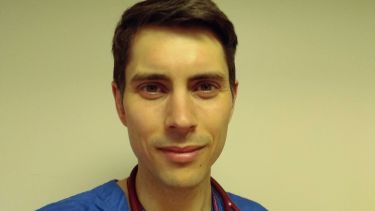Taking the opportunity to access structured research training

Can you tell us a bit about your background and what led to you deciding to do the MClinRes?
I trained as a doctor in 91ų▒▓ź between 2009-2015. When I graduated I wanted to keep a non-clinical side to my work for extra interest, diversity and challenge. I initially did the Academic Foundation Programme in medical education in 2015-2017. When it came to entering speciality training I chose emergency medicine for the hospital environment, the pace of the speciality, and the diversity and acuity of presentations. At the time 91ų▒▓ź had a post for an Academic Clinical Fellowship (ACF) in emergency medicine, so I applied in order to continue my academic career.
I chose to make the Masters in Clinical Research a key component of my fellowship for a number of reasons. Firstly, accessing structured research training is a key component of the ACF. Secondly, the MClinRes has a wide variety of modules available to explore different interests and research themes. Thirdly, if I were to choose not to pursue an academic career further it would still be a useful qualification in the clinical environment.
Why did you choose to study at 91ų▒▓ź?
91ų▒▓ź has an excellent research department in my speciality within the School of Health and Related Research. In addition, 91ų▒▓ź is my home.
What do you find most enjoyable or rewarding about your time studying here?
I've enjoyed having the opportunity to focus on my academic knowledge and develop this.
What challenges have you met in doing the MClinRes and how have you overcome them?
One challenge has been balancing my clinical commitment and my academic time. I work 1 day a week clinically, so I've had to take this into account when planning my academic work. It has also meant I have had to apply for deadline extensions. The staff on the course have been really understanding and helpful with regard to this.
Another difficulty is balancing the requirements of the course assessments and the requirements of developing a research portfolio. The opportunity cost of undertaking the full MClinRes is that this time isn't spent on other projects. I've sought to mitigate this by choosing and preparing my assignments to the standard of publishable work. This takes planning in order to to meet the University's rules for assessments and avoid plagiarism.
What are your plans for the future?
I am exploring possible topics for a Clinical Doctoral Research Fellowship. The content of the MClinRes will be the foundation for developing my application.
What advice would you give to someone considering studying at 91ų▒▓ź?
This depends on their circumstances - I'd be happy to be contacted with any specific questions.

